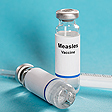Travelers Urged to Move Up Measles Inoculations for Young Children Before Passover/Easter
Posted: Apr. 17, 2019

As public health officials in New York monitor an aggressive outbreak of measles, medical experts at South Nassau and the Nassau County Department of Health urged residents and families to move up measles inoculations for their young children or get inoculated if they haven’t already done so before traveling to be with relatives and friends to celebrate Passover and Easter observations.
Infants normally inoculated at one year can receive their first dose of measles vaccine at 6 months and receive the second dose as little as 28 days later, according to the Centers for Disease Control and Prevention (CDC).
“We are seeing a terrible resurgence of measles in different pockets of the United States and across the world,” said Dr. Aaron E. Glatt, Chair, South Nassau Department of Medicine, and spokesman for the Infectious Disease Society of America. “Measles should have been eradicated, but because some parents have made a conscious decision not to get their children vaccinated, people are dying across the world. Measles is preventable.”
Dr. Glatt, Warren Rosenfeld, MD, South Nassau Chief, Pediatrics, and Lawrence E. Eisenstein, MD, Commissioner of Health, Nassau County, strongly advised that families and residents traveling to areas with known measles outbreak or exposure adhere to the following CDC recommendations for inoculation:
- Infants 6 through 11 months of age should receive one dose of MMR vaccine
- Confirm that all of your children have received the required 2 doses of the Measles (MMR) vaccine
- Children 12 months of age or older should have documentation of two doses of MMR vaccine (the first dose of MMR vaccine should be administered at age 12 months or older; the second dose no earlier than 28 days after the first dose)
- Any adult who did not have measles, or who has not been vaccinated should be vaccinated
- Consult your physician about receiving the vaccination
- If an adult only received one dose of the MMR vaccine when growing up, consider getting revaccinated
“The CDC recommends that children get two doses of MMR vaccine, starting with the first dose at 12 to 15 months of age,” said Dr. Rosenfeld. “However, if you are traveling to areas with known measles outbreaks or with someone you believe has been exposed and have a child older than 6 months who has not been vaccinated, please get them at least their first dose of the vaccine as soon as possible.”
Measles is highly contagious. The CDC reports that cases of measles in the United States have been confirmed in New York, California, Colorado, Connecticut, Georgia, Illinois, Kentucky, Oregon, Texas and Washington- 555 individual cases from January 1 to April 11, 2019. This is the second greatest number of measles cases in a calendar year since 2000, when measles elimination (i.e., the absence of continuous disease transmission for 12 months or more in a specific geographic area) was documented in the United States. So far this year, there here have been more than 112,000 cases reported worldwide.
According to the CDC:
- approximately 9 of 10 susceptible persons with close contact with a measles patient will develop measles;
- 30% of patients who have measles will develop one or more complications: diarrhea, otitis media, and pneumonia, which is the most common cause of associated death;
- most cases of measles are brought back and spread throughout communities by unvaccinated travelers returning from countries and locales where measles is more common.
Around 93% of individuals who receive a single dose of MMR will develop immunity to measles. A second dose gives immunity to almost all individuals (~97%).
“If you or your child develop any rash AND fever we ask that you please exercise the utmost precaution and obtain a medical evaluation before you enter any public spaces,” said Dr. Eisenstein.
Providing the MMR vaccine to a critical portion of the population helps protect other members of the community who are not eligible for the vaccine—such as infants or immunocompromised individuals—because the spread of contagious disease is contained.
The Long Island flagship hospital of the Mount Sinai Health System, South Nassau is designated a Magnet® hospital by the American Nurses Credentialing Center (ANCC) for outstanding nursing care. South Nassau is one of the region’s largest hospitals, with 455 beds, more than 900 physicians and 3,500 employees. Located in Oceanside, NY, the hospital is an acute-care, not-for-profit teaching hospital that provides state-of-the-art care in cardiac, oncologic, orthopedic, bariatric, pain management, mental health and emergency services.
In addition to its extensive outpatient specialty centers, South Nassau provides emergency and elective angioplasty, and offers Novalis Tx™ and Gamma Knife® radiosurgery technologies. South Nassau operates the only Trauma Center on the South Shore of Nassau County verified by the American College of Surgeons as well as Long Island’s only free-standing, 9-1-1 receiving Emergency Department in Long Beach. South Nassau also is a designated Stroke Center by the New York State Department of Health and Comprehensive Community Cancer Center by the American College of Surgeons, and is an accredited center of the Metabolic and Bariatric Surgery Association and Quality Improvement Program.
The hospital has also been awarded the Joint Commission’s gold seal of approval for disease-specific care for stroke, hip and knee replacement, heart failure, bariatric surgery, wound care and end-stage renal disease. For more information, visit www.southnassau.org.